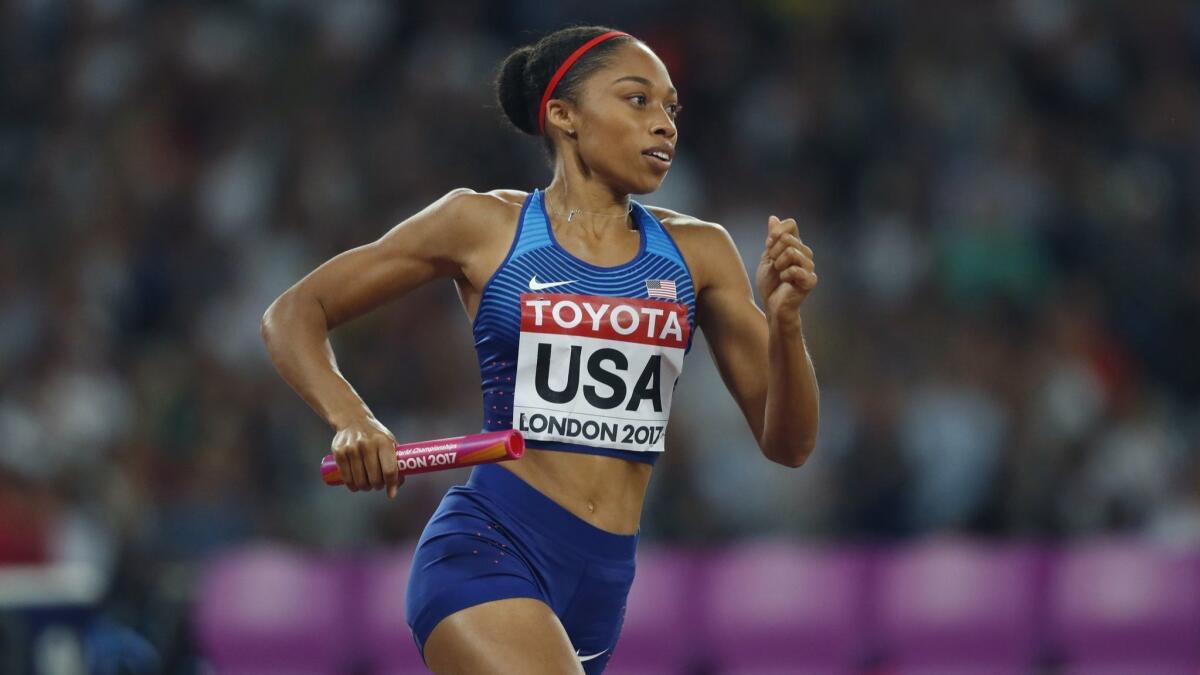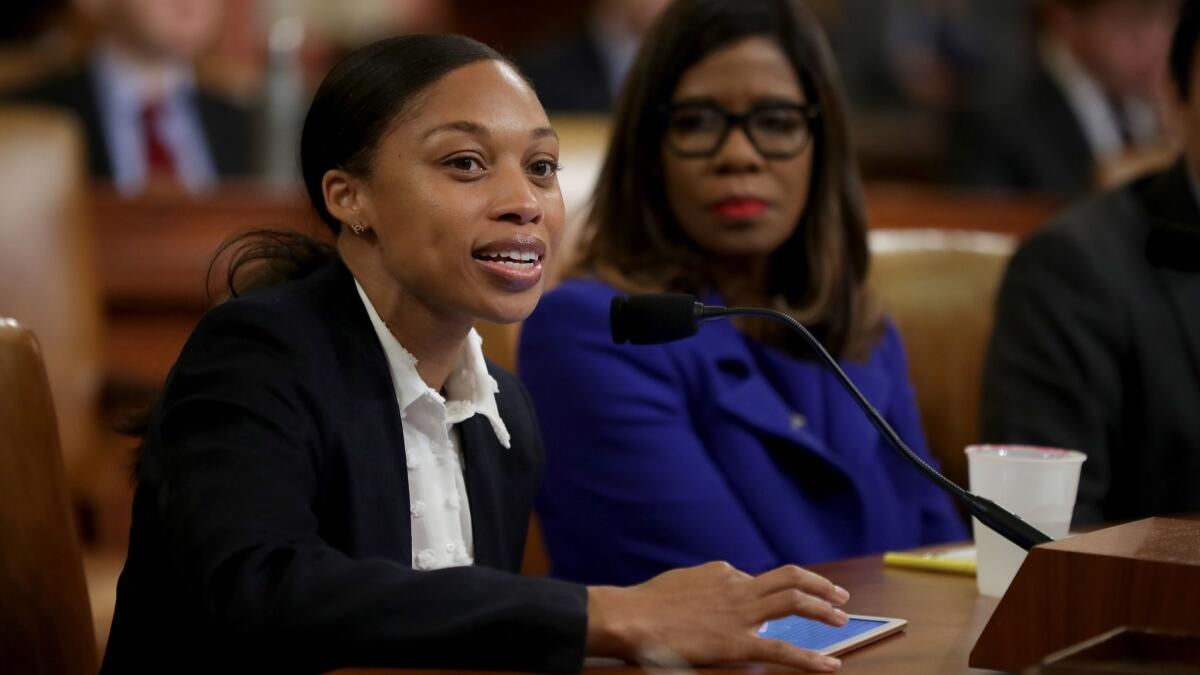Allyson Felix finds a much stronger voice after birth of daughter

- Share via
Her voice was always soft but sure, confident but not boisterous. A pastor’s daughter, Allyson Felix was raised to be respectful and take no shortcuts in running or in life. Along the way, she learned to say what people wanted to hear and do what her coaches told her to do, and that wasn’t a bad way to live.
It led the Los Angeles native to six Olympic gold medals and nine Olympic medals overall, tied for the most won by a female track and field athlete, and earned her universal admiration for competing cleanly in a sport where an unusual result triggers immediate suspicion of cheating.
Not until she gave birth to her daughter, Camryn, in November via Caesarian section and kept vigil at the neonatal intensive care unit for a month while her premature baby gained strength did Felix make a vital discovery: She had to speak her own truths, even if that means she can’t be everything to everyone else.
“I’m a people-pleaser by nature. And so I want to make sure I have all the boxes ticked and everybody’s happy. It’s just, that’s not realistic. It’s just not. And that’s all right,” said Felix, who resumed training on the track in March with a goal of competing at the U.S. championships in July and at the 2020 Tokyo Olympics.
“For me, it’s definitely been a journey to get to this place,” she said. “I’ve never been one to speak out on things or shake things up, but I do think becoming a mother has refined my voice, especially on issues that I feel like I can’t remain silent.”
Felix, 33, recently spoke out in support of Alysia Montano, Kara Goucher and other female athletes who said they weren’t guaranteed salaries by sponsor Nike during and after pregnancy. Montano and Goucher also told the New York Times that they lost their health insurance from the U.S. Olympic Committee and USA Track and Field while having their children.
The USOC said it’s working on reforms to prevent pregnant athletes from losing health insurance coverage; a Nike spokeswoman said in a statement that the company created a policy in 2018 that standardized its approach “so no female athlete is penalized financially for pregnancy.”
The statement also said Nike was waiving performance-pay reductions for 12 months for those athletes who decide to have a baby and will include terms of that policy in its contracts with athletes.

Felix doesn’t plan to have another child while under contract to Nike and wouldn’t benefit from policy changes but felt compelled to speak. “Something about being a mother that it’s bigger than yourself. It’s not about you any longer. Where it’s like, OK, I can take some heat. I’m not doing this for myself,” she said. “It is crazy that it’s 2019 and these are still things that we’re fighting for and even crazier Nike didn’t do anything illegal. They were within their rights. And I think that’s even the bigger conversation to be had. Should that be the case?
“I think it’s important to keep these brands accountable. I don’t hate Nike. I’m proud of the things that we’ve done over the past decade together, so it’s not about that. It’s about the industry as a whole and how can we change this and how can we make it right for women. … It’s shown me the power in our voices. They came out, they spoke and things happened. It’s scary to come out. It’s risky. There’s consequences. But there sometimes is action that’s involved with that.”
While she gets accustomed to her new voice, she’s adjusting to a new normal.
Her husband, former runner Kenneth Ferguson, works for Chrysler, and she alternates training at UCLA with training in Michigan. At least her longtime coach, Bob Kersee, travels to work with her.
“I think I put in my time following him around. It’s my turn,” she said, smiling. Her mother, Marlean, and father, Paul, pastor at Fairview Heights Baptist Church in Inglewood, help with Camryn and sometimes bring her to the track.
Camryn, now past 6 months old, enjoys being a wriggly, giggly exercise tool. “She thinks it’s very funny to be lifted all over the place and do squats with mom and that kind of stuff,” Felix said.
Felix tries to make her workouts more efficient to minimize her time away from Camryn but doesn’t want to cheat her training, and she’s several months behind where her fitness level would usually be.
She plans to compete in the 400-meter run, the event in which Shaunae Miller of the Bahamas edged her for gold with a finish-line dive at the 2016 Rio Olympics, though she might run some 200s, her favorite race and the distance of her memorable gold-medal triumph at London in 2012.
Her competitiveness hasn’t vanished, but there’s now a tug on her heart. “There are times I’m checking my phone. Does she need anything? Is everything good? It’s just getting the balance right,” she said. “I’m still trying to figure it out. I have days where I feel like, ‘Am I doing enough as a mom? Am I doing enough as an athlete? Am I doing enough as a wife?’ Like, how do I get it all straight?”
Few people do. “That’s what I’ve learned,” she said, “that it’s OK not to have it all figured out.” That includes being patient with herself and coping with less sleep. “It’s different coming back from pregnancy because things that were once really easy for you are now difficult,” she said.
Like what? “Running,” she said. “Endurance. I might have a workout where I run a 600 and that might be typically relatively easy for me, but now it’s more challenging because my body is different now and I’m getting back into lifting. It’s kind of like, ‘OK, what does my new body feel like? And how much can I push it?’ I’m getting back to myself, but I’m not there yet.”
Competing in Tokyo remains her ambition, but she’s approaching her quest with a different context. It took her time to understand why, after she triumphed in the 200 at London in 2012 following runner-up finishes at Athens and Beijing, she didn’t feel as complete as she’d imagined she would. It was because she had put more importance on the medal than on the journey.
“It was about the ups and downs and everything that happened along the way that allowed me to grow to a place where I was ready for all that,” she said. “It’s not just about the one gold medal. I think about all the different things that have happened to me leading up to Tokyo, that have made me stronger, that have tested my character. It’s about those things, and it would be amazing to have it culminate with a gold medal, but I don’t think that’s going to change me as a person, adding that.”
She spoke in a voice that was sure and clear. Her own truths, her own eloquence, her own triumph.
Follow Helene Elliott on Twitter @helenenothelen
More to Read
Go beyond the scoreboard
Get the latest on L.A.'s teams in the daily Sports Report newsletter.
You may occasionally receive promotional content from the Los Angeles Times.











